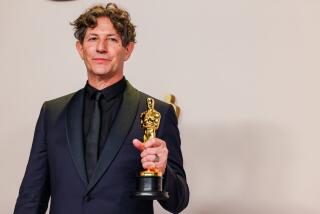The films that Abbas Kiarostami carries inside
Abbas Kiarostami is one of the pillars of Iranian cinema, but because of the turbulent climate at home and his own artistic inquisitiveness, he has recently traveled outside Iran to make his films, in a manner he parallels to the recent vagabond works of Woody Allen.
Kiarostami’s 2010 film, “Certified Copy,” was an enigmatic romance starring Juliette Binoche and opera singer William Shimell set against the timeless beauty of Tuscany. His newest, “Like Someone in Love,” which opens Feb. 15 in Los Angeles, finds him further exploring the slippage of identity, this time in a story set in Tokyo.
Kiarostami’s travels come at a time when the situation for filmmakers in Iran seems particularly imperiled. Though filmmaker Asghar Farhadi won the Oscar for foreign language film last year with his bracing domestic drama “A Separation,” this year the country is boycotting the Academy Awards in protest over the anti-Islamic “Innocence of Muslims” made in Southern California. Numerous filmmakers such as Jafar Panahi have faced imprisonment, house arrest and official bans from filmmaking for their work.
PHOTOS: Celebrity portraits by The Times
“I understand that given the societal situation that we go through in Iran,” said Kiarostami, 72, via a translator, “for the audience the question is always whether I went out of Iran because of the situation or for other reasons.”
On a recent phone call from Tehran, it is Kiarostami who first brings up Allen, mentioning having just read an interview with the quintessential New York filmmaker who has also been making recent movies in other countries, and expresses a sense of kinship despite their obvious differences. “I think Woody Allen is Woody Allen, and no matter where he goes he still makes his Woody Allen films,” he said.
As to whether an Abbas Kiarostami film is an Abbas Kiarostami film, whether shot in Tehran, Tuscany or Tokyo, the filmmaker said: “That should be the case, but I’m not the one who can actually judge. You should be the one to judge whether it’s still Kiarostami or not.”
From his first film, 1970’s “Bread and Alley,” Kiarostami has returned to favored themes with what might be thought of as a low-key boldness, an unshowy self-assurance in at times dizzying examinations of the gulf between fact and fiction in modern life. He won the Palm d’Or at the Cannes Film Festival with his 1997 film “Taste of Cherry.” In 1990’s “Close-Up,” he blended documentary footage with staged sequences featuring real-life participants from the strange story of a man who tried to pass himself off as fellow Iranian filmmaker Mohsen Makhmalbaf.
Marin Karmitz, Kiarostami’s longtime French producer who has worked with filmmakers such as Alain Resnais, Claude Chabrol and Jean-Luc Godard, said he felt Kiarostami’s films bore the imprint of the director no matter where they are made. Karmitz compared Kiarostami’s recent films to when he produced the trans-national “Three Colors” trilogy for Polish director Krzysztof Kieslowski.
“I think he is a deeply Iranian director who speaks of feelings people all over the world experience,” Karmitz said on the phone from Paris. “I think he carries his world wherever he goes.”
STORY: The independent film breakout stars of 2012
“Like Someone in Love” opens with a dazzling sequence that situates the viewer completely within the world of the film while also creating an instant ambiguity as to the film’s point of view. As the camera prowls through a Tokyo nightclub, snippets of conversations can be heard until the scene settles on a young woman (Rin Takanashi) who, it turns out, is putting herself through school by working as an escort.
She is sent to the apartment of an elderly professor who is more interested in talking than anything else. (The old man is played by Tadashi Okuno, now in his 80s and acting in films for more than 50 years as an extra but with “Like Someone in Love” has his first lines of dialogue in a film.) The next day he gives her a lift in his car, and after they encounter her boyfriend (Ryo Kase), the three of them become unexpectedly intertwined. The trio all seem to shift in their intentions and desires, from friendly and warm to sinister and agitated, creating a prismatic look at relationships and generational dynamics.
While some might see Kiarostami’s further examinations of personal dramas as evading the political situation in his homeland, for him it is most important to maintain artistic control and freedom.
“I would say that no film is apolitical. There are politics in all films,” he said. “Any film that is anchored in a society, any film that deals with humanity is necessarily political. There are politics in it, but I do think my role is to make audiences sense the politics indirectly.”
Karmitz noted: “I think there is a great deal of pressure put on artists like Kiarostami to pull them into a framework of politically engaged subject matter. And this gets to an important question, what is the role of an artist in the context of history? Was Picasso only painting war during the war years? And Abbas Kiarostami speaks a lot about Iran without directly speaking about it.”
Kiarostami’s travels abroad seem to have deepened his sense of mystery, with both “Certified Copy” and “Like Someone in Love” exploring role-play in everyday life, as well as pushing further his elliptical sense of narrative. In “Like Someone in Love” in particular, Kiarostami seems to have moved beyond more conventional storytelling into something richer, providing a sense that the story continues even as the film concludes.
“My way of expression is full of complications and mystery because that’s my perception of life,” he said. “I’ve always said that my only inspiration in my films is taken from life. And as life is full of mystery, there is no other way I can represent life than in mysterious films. It’s just my way of being.”
Kiarostami acknowledges the specificity of his situation, that he is still able to live in Iran but leave the country to make his films, though he stops short of declaring himself an artistic exile from his homeland.
“I hope every day I’ll be able to shoot my next film in Iran, in conditions that would be just a bit better than they are right now, in my own language and on the land on which I live,” he said. “But if the situation remains as difficult as it’s been recently and as it is now, I’ll have to again go abroad.”
PHOTOS AND MORE
VIDEO: The making of ‘Argo,’ ‘Les Miz’ and more
ENVELOPE: The latest awards buzz
PHOTOS: NC-17 movies: Ratings explained
More to Read
Only good movies
Get the Indie Focus newsletter, Mark Olsen's weekly guide to the world of cinema.
You may occasionally receive promotional content from the Los Angeles Times.







